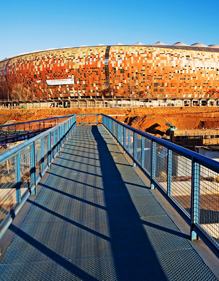|
Getting your Trinity Audio player ready...
|
 By Valencia Talane
By Valencia Talane
Large companies hoping to do work with government in future will have to heed a stern warning from the Competition Commission, which today slapped 15 construction firms with penalties amounting to R1.5-billion for tender-rigging and collusion for projects done between 2006 and 2010. Read the full press release here.
The value of these projects, amounted to R47-billion, R19-billion were for the private sector and R28-billion were for the state. The investigation into this cartel activity was done over the last three years.
The individual fines range from just under R200 000 to R306-million and R311-million respectively for large industry players Aveng and WBHO. The settlement deals took into account the annual turnover of each company and the number of projects each was involved in.
Corruption Watch executive director David Lewis on Monday expressed his satisfaction with the terms of the settlement: “Price-fixing, particularly that involving public-sector contracts, is a clear example of corruption by private-sector firms,” he said.
Corruption Watch, said Lewis, commends the Competition Commission not only for the investigation, but for the large fines levied on these firms. “Here we have a case where corruption has had consequences for those who chose to take part in it.”
The deal is a result of the Construction Fast Track Settlement Process, which was an incentive launched just over a year into the investigation. Its aim was to give incentives for firms’ full cooperation.
If the firms participated in the process, and committed to full and truthful disclosure on their part in the illegal scheming, they could secure lower penalties than the commission would ordinarily impose in prosecuting them.
Failure to take part in the process would mean being subjected to full investigations and duly prosecuted where applicable. Non-participants would also be opening themselves up to much higher fines than the fast-track settlement option would pose.
Of the 15 firms ordered to pay the settlement, three – Group 5, Construction ID and Power Construction – did not accept and now face prosecution.
Competition Commissioner Shan Ramburuth expressed his satisfaction with the impact of the fast-track settlement. “In revealing the extent of collusion in the construction industry, the settlement importantly broke up existing cartels and created awareness of collusive practices in the industry,” he said.
In their submissions to the process, firms revealed how they would form clusters to coordinate tenders over different projects. They would then collude to decide who would submit the legitimate bid, while the rest handed in bogus bids, enabling the chosen conspirator to win the tender in question.
Furthermore, a “loser’s fee” – a pre-determined amount that the winner would then pay to the losers to help cover their bidding expenses – would be decided on at these meetings. According to a statement by the commission, the companies had a long history of masterminding the process of determining, maintaining and monitoring collusive agreements; and meetings were held as part of the tradition to decide on how to divide markets and margins.
“Embedding a competitive culture will be critical to bringing down the costs of future infrastructure investments and will incentivise firms toward innovation and efficiency in future projects,” added Ramburuth.
Lewis said other law-enforcement agencies should take note of the Competition Commission’s work in this case in dealing with corruption.








